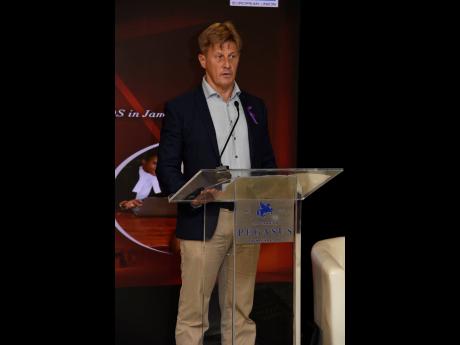Shatter the global cloak of silence – UNFPA, EU
Women and girls across the globe have been exposed to more physical and sexual abuse since the onset of the COVID-19 pandemic as a result of the necessary confinement measures implemented to contain the spread of the coronavirus.
It is for this reason that the European Union and the United Nations are appealing to victims and those who know of their plight to help shatter the global cloak of silence under which this scourge continues to breed and thrive.
On Wednesday, which was observed as International Day for the Elimination of Violence Against Women and marked the start of the 16 days of Activism 2020, Deputy Head of the European Union Delegation to Jamaica Fredrik Ekfeldt and Deputy Director of the United Nations Population Fund (UNFPA), Sub-Regional Office for the Caribbean, Seth Broekman used the banner event hosted by the Ministry of Culture, Gender, Entertainment and Sports under the them ‘The Empowered Woman: From Victim to Survivor’ at The Jamaica Pegasus hotel, to call on Jamaicans to help break this vicious cycle.
“We all know that violence thrives in silence in the most private corners of our societies, and this is why the European Union and the United Nations want to join all stakeholders to put a spotlight on this scourge and help women and children to step out into the spotlight,” Ekfeldt appealed, admitting that it was an issue that continues to affect him personally.
“This absolutely despicable violence that we see against women, for me it’s hard to take in, though I have been working as a European civil servant for many years and working with human rights issues and heard many terrible stories. It is time to leave the violence against women behind us. It is one of the greatest injustices of our time,, and it touches all cultures, communities and families.”
The European Union diplomat said violence is one of the biggest barriers to achieving sustainable development for women. He stated that it was a fact that societies that include women in socio-economic structures are doing much better (economically) than those that neglect and forget women. Ekfeldt also disclosed that one in every three women worldwide, including in Europe, still suffers physical or sexual violence, often at the hand of an intimate partner.
He also pointed out that while COVID-19 affects women, girls and boys in their diversity, in all the different ways, the evidence shows women are disproportionately more exposed to health and socio-economic risk.
“They face an increase in sexual and gender-based violence due to necessary confinement policies, lack of access to water, sanitisation and essential ecosystem services. These terrible crimes often go unnoticed – unseen and unspoken. This is simply unacceptable, and we need to stand up, speak out against it, and stop the violence once and for all,” he urged.
TIME TO LIFT THE COVERS
Meanwhile, Broekman quoted from the Jamaica Women’s Health Survey of 2016 in driving home the point that it is time to lift the covers off this age-old heinous crime once and for all.
“Not only did it reveal that the lifetime prevalence of intimate physical and/or sexual violence for between 15 and 64 years of age is 27.8 per cent, or more than one in four women. It also revealed that a majority of respondents believed that violence between husbands and wives is a private matter. We recognise that as long as violence against women is kept hidden, it will continue to occur.”
Broekman noted, however, that Jamaica was making strides in terms of providing support for women who are urgently in need of help in order to break the cycle of violence in which so many have been trapped for life.
“We know from the Jamaica Women’s Health Survey that 63 per cent of abused women do not seek help from any of the critical service under the Spotlight Initiative, UNFPA is working with the Bureau (of Gender Affairs) to strengthen the helpline for survivors of violence to operationalise the gender-based violence network at the parish level and to establish and operationalise three state-run shelters, including the development of protocols and guidelines to guarantee that safety and appropriate care are being provided.
“In these shelters, women and girl survivors of violence and their children will have a safe space to stay while accessing a holistic range of support tailored to meet their diverse needs.”
Turning to the multiplier effect of COVID-19 on violence against women and girls, the United Nations diplomat described its impact as a ‘pandemic within a pandemic”, noting that the COVID crisis has taken a staggering toll on people, communities, and economies. Yet not everyone is affected equally.
“Since the outbreak of COVID-19, emerging data and reports from those on the front lines have been shown that all types of violence against women and girls, particularly domestic violence, has intensified. In some countries, calls to help lines have increased five-fold.
“In Jamaica too, the Victim Support Division saw a dramatic increase in the number of rape and child sexual abuse cases reported in March and April, with a troubling increase in sexual violence against girls. We can speak of a pandemic within the COVID pandemic.”

